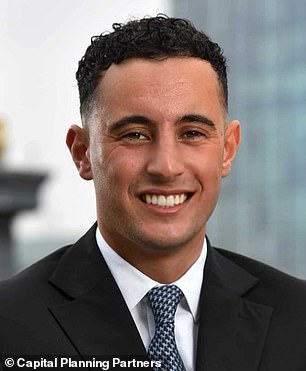My husband and I, both 68, own our house worth £650,000, plus three flats which we rent out. The flats are worth about £150,000 each.
We would like to transfer the flats (or two of them) into our two children’s names. Our children are both married with young children.
Is there a way to do this that would avoid capital gains tax, and inheritance tax?
Both our children would prefer to keep the flats, rented out, as a source of income. Would the fact that my son lives in Sweden present problems? A.J, via email
SCROLL DOWN TO ASK YOUR FINANCIAL PLANNING QUESTION

This reader wants to pass their buy-to-let properties to their two children, but are concerned about a potential tax bill
Harvey Dorset, of This is Money, replies: Given your ages, you likely still have plenty of time to pass on this wealth.
While it is simple enough to transfer these properties free of inheritance tax, under the seven-year gifting rule – assuming you both live for another seven years – this does not address your potential capital gains tax liability.
Depending on how long you have held these rental properties, they could have increased considerably in value, meaning you could be left with a huge CGT bill, as gifts are considered a disposal under gifting rules.
However, there are still options open to you to pass these properties without paying over the odds.
This is Money spoke to two financial advisers to find out how you can transfer these properties to your children without incurring a tax bill, and how your son’s residency in Sweden could affect this.

Simon Stygall says there will be no IHT on the properties if you survive for seven years after gifting them outright.
Simon Stygall, independent financial adviser at Flying Colours, replies: Transferring your rental flats to your children is a generous and potentially tax-efficient way to pass on wealth.
However, there are several tax considerations to take into account; namely capital gains tax and inheritance tax.
While there are ways to mitigate or defer some of the tax charges, complete avoidance is rarely possible.
Capital gains tax
When you gift an asset, such as a rental flat, to someone other than your spouse, HMRC treats it as a disposal at market value.
This means that even if no money changes hands, you’re deemed to have sold the property for its current market value, and any capital gain since the date of purchase may be subject to CGT.
For example, if each flat was originally purchased for significantly less than £150,000, you could face a substantial CGT bill.
When it comes to CGT, the responsibility usually falls on the person who made the gift rather than the person receiving it. And while your children won’t have to pay CGT, they may need to consider future rental income and whether it falls within their personal tax allowances.
The first £3,000 is tax-free (based on tax year 2024/25). Profits higher than that are taxed at different rates depending on your income tax bracket:
• Basic-rate taxpayers: pay CGT at a rate of 18 per cent for gains on rental property
• Higher-rate taxpayers: pay 28 per cent
One potential mitigation is hold over relief, which can be used when gifting business assets or where the asset is transferred into certain types of trusts.
Unfortunately, rental properties do not usually qualify as business assets under HMRC’s definition.
However, if you were to use a Trust structure, such as a Discretionary Trust, it might be possible to defer CGT.
Instead of being taxed at the time of the gift, the capital gain is ‘held over,’ meaning the person receiving the asset takes on the original acquisition cost and any built-up gain.
This means that while you, as the donor, won’t immediately pay CGT, the recipient (in this case, the trustees of the trust) will eventually pay tax when they sell the asset.
However, there are various other tax considerations when moving a property into Trust, potentially both on entry, periodically, and on exit from the Trust – it is therefore very important to seek advice from a Solicitor when considering this, and you need to understand Trusts do involve ongoing administration and legal costs.
> How capital gains tax works: The rates you pay – and how to cut your bill
Inheritance tax (IHT)
The IHT-free threshold is currently:
• £325,000 per individual, until 2028.
• An additional £175,000 if a qualifying residence is passed to children or grandchildren, raising the threshold to £500,000.
• If you’re married, or in a civil partnership, you can combine your allowances to achieve a joint IHT allowance of £1million.
Your children won’t pay any IHT on the gifted property if your entire estate falls below these allowances, or you live for seven years after the gift is made.
The nil rate band can be used against lifetime gifts that become chargeable if death occurs within seven years.
Gifts made during your lifetime are known as potentially exempt transfers (PETs).
So, if you gift a flat outright to your children and survive for seven years from the date of transfer, the value of the gift falls outside of your estate for IHT purposes after those seven years.
However, if either of you were to die within seven years, some or all of the value may still be included in your estate, potentially triggering IHT.
Taper relief may apply, reducing the tax due on the gift depending on how long you survive after making it.
Importantly, taper relief only applies to the tax payable, not to the value of the gift.
Also important to note, taper relief only applies to the value of the gift in excess of the nil rate band – ordinarily £325,000 if a gift from one individual, or potentially £650,000 if a joint gift.
> How inheritance tax works – and what families must know
What else can you do to cut your tax bill?
Your children should also be aware that rental income is subject to income tax at their marginal rate.
As regards your son living in Sweden you would need to consult a specialist who is qualified to advise on the tax treatment and any legal implications given that he is UK domiciled but resident in Sweden.
Finally, you also need to keep accurate records of everything that you do to prove to the HMRC that rules have been followed, should they ask.
It is also a good idea to keep your Wills up to date too to ensure that your wishes are followed.

Joe Akik warns holdover relief cannot be claimed if the properties are gifted directly
Joe Akik, wealth manager at St James’s Place partner practice Capital Planning Partners, replies: When gifting an asset like rental property to your children, to avoid realising any gain – and therefore paying capital gains tax – at the time you’ve made the gift, you could consider using a Trust.
Where property is gifted to a discretionary, or an interest in possession trust, it is possible for the person making the gift to claim CGT relief known as ‘holdover relief’.
This defers CGT and instead, the gains made since acquisition of the gifted flats is passed to the trust and taxed only when the trustees (you) sell or otherwise dispose of the flats.
If your children are both UK residents, you can claim holdover relief if you transfer the properties out of the trust to your children before the sale of the property, to ensure that any gain is ultimately assessed on the beneficiary who may pay CGT at a lower rate than the trustees, and with the benefit of a higher annual exempt amount.
Holdover relief cannot, however, be claimed on transfer out of trust to a non-resident beneficiary.
Of course, trusts have setup and ongoing tax costs. Provided you are happy for your children to receive the rental income, high trust tax rates on rental income can be avoided by using an interest in possession, rather than a fully discretionary, trust.
Under an ‘interest in possession trust’, your children would have an entitlement to the rental income thereby ensuring that they are taxed on it directly and the high trust rates of tax are avoided.
You should speak to a solicitor if you are interested in using a trust to make a gift of one or more of your properties.
Note that you will not be able to claim holdover relief to defer your gain if you gift the flats outright/directly to your children.
Nonetheless, if your gain is relatively low and/or you have brought forward losses or significant renovation costs that can be offset against your gain, gifting the flats outright and paying CGT on the profit after your combined £6,000 annual exemption (£3,000 each) may be more straightforward and ultimately more cost-effective overall.
As an alternative to making a gift to a trust and using holdover relief to defer your gain, it may be possible, if you have cash available for investment, for you to defer your gain by investing an amount of cash equivalent to your gain into shares in an Enterprise Investment Scheme (EIS).
Such investments may also provide the added benefit of IHT relief after a qualifying period of ownership.
However, these investments are not suitable for most individuals due to their high-risk and advice should therefore be sought.
Reducing IHT
Making a lifetime gift of one or more of your properties – whether outright or to a trust – will reduce your estate for inheritance tax purposes and therefore your IHT liability.
If you gift and survive seven years, then no IHT applies.
However, if you die within the seven years, the value transferred will use up part of the nil rate band that would otherwise have been available to your estates on death.
You will also need to forego future access to both the rental income and the proceeds of sale for the gift to be effective for IHT purposes.
If you continue to benefit from either, the properties will continue to form part of your taxable estate and no IHT saving will be made.
If the flats are transferred to a trust rather than to your children outright, it will be important to bear in mind that the trust could incur periodic inheritance tax charges of up to six per cent every 10 years.
However, such charges will not usually arise if either the value of the trust fund at the tenth anniversary is below the nil rate band available to the trust (this would typically be £650,000 if the flats are owned jointly and you have not made any other gifts in the last seven years); or the trust fund is wound up by distributing the properties out of trust to the children before the tenth anniversary arises.
Sweden and income from trusts
Receiving an income from the rental profits will impact your children’s tax liabilities. Depending on the level of their other income and the amount of rental income generated, this could push your UK resident child into a higher tax bracket.
Your son who is resident in Sweden will also need to declare and pay UK tax on any UK property rental income that he receives, either directly or through a trust.
If received through a trust, he will get a credit for any tax paid by the trustees.
Your son may also be liable to tax in Sweden on the same income but would usually be able to claim a credit for UK tax paid under the UK-Sweden Double Taxation Agreement to avoid a double charge.
In complex situations like this, your son would need to consult a Swedish tax adviser.
It is assumed in this response that neither of the flats are subject to existing mortgages. Where there is a mortgage, this can cause additional complications.
Get your financial planning question answered
Financial planning can help you grow your wealth and ensure your finances are as tax efficient as possible.
A key driver for many people is investing for or in retirement, tax planning and inheritance.
If you have a financial planning or advice question, our experts can help answer it. Email: financialplanning@thisismoney.co.uk.
Please include as many details as possible in your question in order for us to respond in-depth.
We will do our best to reply to your message in a forthcoming column, but we won’t be able to answer everyone or correspond privately with readers. Nothing in the replies constitutes regulated financial advice. Published questions are sometimes edited for brevity or other reasons.
<!- – ad: https://mads.dailymail.co.uk/v8/us/money/financialplanning/article/other/mpu_factbox.html?id=mpu_factbox_2 – ->

